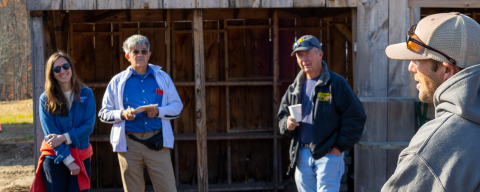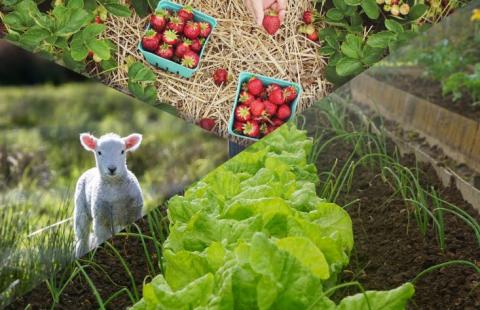The NH Farm Network is a collaboration of agriculture service providers who directly assist seasoned and aspiring New Hampshire farms and farm workers. As a network, we aim to deepen relationships across organizations and work collectively to address challenges associated with farming in New Hampshire. We encourage new and seasoned farmers to learn about our work and the many ways in which we serve the Agriculture Community.
The NH Farm Network meets quarterly to stay connected and share information. If you represent an agency or institution that works with New Hampshire farmers and are interested in being a part of the NH Farm Network, please contact Olivia Saunders at Olivia.Saunders@unh.edu or 603-447-3834.
Upcoming NH Farm Network Open Forum Meetings:
March 2, 2026 | 1:00pm-2:30pm | Online | Topic: TBD
June 1, 2026 | 1:00pm-2:30pm | Online | Topic: TBD
September TBA | In-person | NH Agriculture Professionals Day
- December 1, 2025 | Adaptation in Practice: Tools and Management Strategies Farmers Are Deploying
- June 2, 2025 | Beginning Farmer Support Networks
- March 3, 2025 | Agricultural Census
- Jul 8, 2024 | Creatively Addressing Climate Risks
- Apr 1, 2024 | Measuring impact and equitable lending: spotlight on Walden Mutual
- Jan 8, 2024 | How do we define a farm?
- July 10, 2023 | Disaster Response
- April 10, 2023 | Resilient Farms - Mitigating Economic Risks
- January 9th, 2023 | Focus on Funding
Grants

NH Food Alliance hosts a database of grants for farmers, food businesses, and food system organizations in the United States, New England, and New Hampshire. Filter by the “Audience” field to find grants specific to farm businesses.
Search available grants
Resources
Each of New Hampshire’s 10 counties has an active conservation district, sometimes know as the soil and water district. The work within each district is unique, but in general they help local people to conserve land, water, forests, wildlife and related natural resources. Districts across the country share a single mission: to coordinate assistance from all available sources – public and private, local, state and federal – in an effort to develop locally-driven solutions to natural resource concerns. Many districts in NH offer equipment rental programs.
Providing risk management plans for the New Hampshire producers through the USDA Crop Insurance program.
A customer owned cooperative providing full financial services for agricultural businesses, timberland owners, commercial fishers and farm related businesses. They provide credit, tax, records, payroll, appraisal and business consulting services to N.H. producers and host the County Living Loans website.
Providing education, outreach and support for graziers here in N.H. through programs, webinars and one on one help for producers at any stage of grazing and grass management.
Providing training, referrals and advising to help farmers, landowners and communities navigate the complex challenges of farmland access, tenure and transfer. This includes assisting farmers developing a farm transfer plan or recruiting a successor, aiding a farmland seeker in conducting a farmland search and helping landowners with drafting a lease agreement - and many steps in between.
Provides free legal assistance to income-eligible farmers, food businesses, and nonprofits throughout New England by matching them with pro bono attorneys in our network. They have placed more than 1,000 cases over the years, offer free legal guides through a Resource Library, and coordinate an annual winter webinar series.
As the university's first research organization, the New Hampshire Agricultural Experiment Station has been an elemental component of New Hampshire's land-grant university heritage and mission since 1887. They provide unbiased and objective research on sustainable agriculture and foods, horticulture, forest management and related wildlife, the environment, natural resources, and quality of life topics. Scientists manage more than 50 research projects at any one time, partner with state and regional farmers, growers, and producers, and collaborate with leading scientists worldwide to directly benefit New Hampshire and New England.
Providing free mediation services to the ag community in NH on a variety of issues.
NHACD’s conservation planners can provide clients with a number of conservation products: Conservation action plans such as grazing management plans, nutrient management plans, highly erodible land compliance plans, or soil health management system plans, technical assistance to a wide range of agriculture producers from maple syrup or timber producers to livestock or diversified vegetable operations. Connections to other technical and financial assistance providers in the state, Connections to other growers who have demonstrated expertise in their field for peer to peer collaboration opportunities. Guidance on the process of applying for financial assistance programs from the USDA’s Natural Resource Conservation Service.
Providing networking opportunities for beef producers in New Hampshire, including access to officials at the Department of Agriculture, local businesses, and fellow producers.
Providing flexible capital to grow more local food businesses. They work across the food system from producer to processor to consumer, and offer comprehensive assessment and customized advice from a diverse network of professionals. Their mission is to serve as a catalyst, leveraging financial, human, and civic resources to enable traditionally underserved people to participate more full in New Hampshire's economy.
Performing regulatory duties, including surveillance testing, foreign animal disease investigations, assistance with international animal import/export, animal disease traceability/animal identification, and producer outreach/education. We also fund a scrapie necropsy program, covering the costs of a gross necropsy and disposal through NHVDL for any sheep/goat that is eligible for scrapie testing.
Supports farmers and farm success in many ways, including marketing and business technical assistance, land and capital access, strengthening our regional food system, promoting regional resilience and farm viability by increasing climate adaptation and mitigation practices, and increasing community connection to our working lands.
Each of New Hampshire’s 10 counties has an active conservation district, sometimes know as the soil and water district. The work within each district is unique, but in general they help local people to conserve land, water, forests, wildlife and related natural resources. Districts across the country share a single mission: to coordinate assistance from all available sources – public and private, local, state and federal – in an effort to develop locally-driven solutions to natural resource concerns. Many districts in NH offer equipment rental programs.
Creates market development opportunities that result in increased sales for agricultural producers, and as the department's public information office, inform the public of the value and diversity of the state's agricultural heritage and industry.
A customer owned cooperative providing full financial services for agricultural businesses, timberland owners, commercial fishers and farm related businesses. They provide credit, tax, records, payroll, appraisal and business consulting services to N.H. producers and host the County Living Loans website.
NHACD’s conservation planners can provide clients with a number of conservation products: Conservation action plans such as grazing management plans, nutrient management plans, highly erodible land compliance plans, or soil health management system plans, technical assistance to a wide range of agriculture producers from maple syrup or timber producers to livestock or diversified vegetable operations. Connections to other technical and financial assistance providers in the state, Connections to other growers who have demonstrated expertise in their field for peer to peer collaboration opportunities. Guidance on the process of applying for financial assistance programs from the USDA’s Natural Resource Conservation Service.
Providing flexible capital to grow more local food businesses. They work across the food system from producer to processor to consumer, and offer comprehensive assessment and customized advice from a diverse network of professionals. Their mission is to serve as a catalyst, leveraging financial, human, and civic resources to enable traditionally underserved people to participate more full in New Hampshire's economy.
The NH Food Alliance hosts a database of grants for farmers, food businesses, and food system organizations in the United States, New England, and New Hampshire. Filter by the “Audience” field to find grants specific to farm businesses.
FSA’s Direct Loan Program is designed to help farmers start, purchase, or expand their farming operation. From beginning farmers who have limited financial history to qualify for commercial credit to farmers who have suffered financial setbacks from natural disasters, FSA offers a variety of loans to provide additional resources farmers need to establish and maintain profitable farming operations. Farmers may apply for direct loans at their local FSA offices.
Offers technical advice and expertise to farmers, ranchers, forest landowners and others seeking to make voluntary conservation improvements on their land that also improve their agricultural operation. NRCS can also provide incentives for landowners wanting to put wetlands, agricultural lands or forests under long-term easements. Through the Farm Bill, NRCS offers financial assistance to landowners to make those conservation improvements through competitive funding opportunities annually.
Offers technical assistance and information to help agricultural producers and cooperatives get started and improve the effectiveness of their operations.
Offers custom, competitive, loan and deposit products with support from people who have been in your shoes as operators. Their loans support land, building, or equipment acquisition / refinancing, Organic transitions, working capital lines, and other needs. The first new mutual bank in New Hampshire in 100 years, they operate with a mutual (or cooperative) governance model, focused on sustainable farm and food-focused digital banking.
NH DEPARTMENT OF AGRICULTURE MARKET AND FOOD (NHDAMF)
Supports and promotes agriculture and serves consumers and business for the benefit of public health, environment and economy. The agency has regulatory oversight for many different aspects of agriculture, including plant and animal health. NHDAMF is also involved in agricultural policy development and marketing.
Creates market development opportunities that result in increased sales for agricultural producers, and as the department's public information office, inform the public of the value and diversity of the state's agricultural heritage and industry.
Primarily regulatory role to minimize disease risk and exposure.
Provides export certification of primarily live plants and seeds to meet import requirements of other states and countries. Survey for pests of agricultural and environmental significance to NH, not known to be established, or of limited distribution in the US. Compliance agreements to facilitate movement of plants and plant parts under quarantine, such as certification of heat treated firewood. Licensure of those selling rooted plants.
Permitting agency for the use of pesticides. Compliance review of pesticide management.
Assures regulatory compliance in the marketing of certain farm products and agricultural commodities; helps promote market opportunities, and accuracy and quality of agricultural and horticultural products.
Free testing, certifying, and sealing of scales used by an agricultural business that grows and sells their own products. Advises farmers on the proper method of sale for products.
Protects the safety and security of the N.H food supply and prevents foodborne illness and injuries through inspection, enforcement and education.
Providing training, referrals and advising to help farmers, landowners and communities navigate the complex challenges of farmland access, tenure and transfer. This includes assisting farmers developing a farm transfer plan or recruiting a successor, aiding a farmland seeker in conducting a farmland search and helping landowners with drafting a lease agreement - and many steps in between.
Providing networking opportunities for beef producers in New Hampshire, including access to officials at the Department of Agriculture, local businesses, and fellow producers.
A membership organization dedicated to advocating for and educating the public about agriculture.
A network of people, businesses, organizations, and communities working together to build a food system that works for all in New Hampshire. The NH Food Alliance connects and amplifies the incredible work of our partners throughout New Hampshire and New England by catalyzing collaboration and collective action. We work together to grow and sustain local farms, fisheries, and food businesses, secure healthy food access for all, build climate resilience, and ensure racial equity in our communities and workplaces.
The New Hampshire Fruit Growers Association is an organization of farmers who all share a passion for growing good fruit and grow New Hampshire apples with care for local customers. Our mission is to promote the New Hampshire fruit industry through grower education on the most up-to-date crop and pest management techniques available.
The New Hampshire Vegetable and Berry Growers Association (NHVBGA) promotes the interests of NH vegetable and small fruit growers by creating marketing opportunities and consumer education of NH grown produce. We also promote educational and research opportunities for its members through training opportunities, workshops and annual meetings.
The purpose of the association is to: Promote the production of premium New Hampshire wines, ciders, and mead. Represent the interests of New Hampshire winemakers and growers of grape, apple and agricultural crops used by winemakers. Provide a forum for the exchange of ideas and information between winemakers. Develop educational programs to improve winemaking and viticulture. Create and market a New Hampshire wine trail. Encourage educational institutions to support the wine industry with expertise, faculty, and research and assist with the development of programs and curricula. Develop the NHWA on-line presence to bring the local grape, wine, and hospitality community closer through enhanced communication channels. Develop a marketing program which enhances the image of the New Hampshire Winery Association and its members.
Provides outreach, education, information, advocacy, and a network for organic, agroecological, and regenerative farmers and their supporters (i.e. farmers, gardeners, and eaters interested in food grown without synthetic fertilizers and pesticides). We provide peer-to-peer teaching based on the Collaborative Regional Alliance for Farmer Training (CRAFT) program; opportunities to learn from national and regional leaders in the organic movement; and connections with regional, national, and international organizations concerned with this effort (NOFA chapters, OFA, NFFC, IFOAM, land trusts, lawyers, and other services).
Supports farmers and farm success in many ways, including marketing and business technical assistance, land and capital access, strengthening our regional food system, promoting regional resilience and farm viability by increasing climate adaptation and mitigation practices, and increasing community connection to our working lands.
Each of New Hampshire’s 10 Counties has an active conservation district, sometimes know as the soil and water district. The work within each district is unique, but in general they help local people to conserve land, water, forests, wildlife and related natural resources. Districts across the country share a single mission: to coordinate assistance from all available sources – public and private, local, state and federal – in an effort to develop locally-driven solutions to natural resource concerns. Many districts in NH offer equipment rental programs.
This material is based upon work supported by the National Institute of Food and Agriculture, U.S. Department of Agriculture, through the Northeast Sustainable Agriculture Research and Education program under subaward number SNE21-008-NH.
Extension Services & Tools That Help NH Farmers Grow
Newsletters: Choose from our many newsletters for production agriculture
Receive Pest Text Alerts - Text UNHIPM to (866) 645-7010





